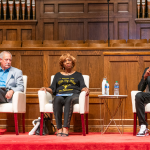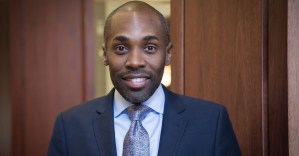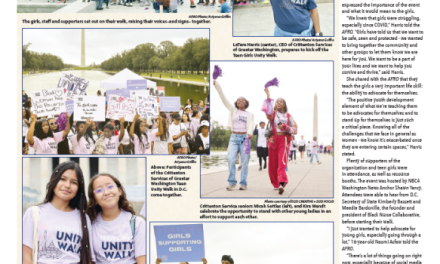By Ryan Michaels
The Birmingham Times
When Janice Wesley Kelsey heard the Rev. James Bevel speak during a mass meeting at New Pilgram Baptist Church in Birmingham 60 years ago, she knew then she would fight to help desegregate the city where she lived.
Kelsey, who at age 16 participated in the Children’s Crusades heard Bevel, Dr. Martin Luther King Jr.’s lieutenant, point out the differences between the resources at Black and white high schools in the city.
“He asked, ‘At your school…how many electric typewriters do you have?’ And I said, ‘We have one, but I’m a good typist. I get to use it.’ He said, ‘Do you know how many they have at (all white?) Phillips High School?’…He said, ‘They have three rooms of electric typewriters.’ I thought, ‘Wow, that’s not fair,’” said Kelsey, who attended the former Samuel Ullman High School.
Kelsey, Birmingham Mayor Randall Woodfin and Dr. Andrew Manis, and Rev. Fred Shuttlesworth’s biographer, were on an empowerment panel “1963: 60 Years of Black Resistance” during 2023 Birmingham Freedom Fest at Sixteenth Street Baptist Church moderated by Denise Gilmore, senior director of the city’s Division of Social Justice and Racial Equity.
The Birmingham demonstrations were the impetus for the passage of landmark Civil Rights legislation like the Voting Rights Act of 1964.
While significant progress has been made since then Kelsey, who was arrested while marching during the Children’s Crusade, said recent Court rulings show how much more still needs to be done.
“We’re still dealing with some of the vestiges of what we were dealing with before [Civil Rights legislation] was passed,” said Kelsey, pointing to continued segregation through redlining, attacks on voting rights, as well as the U.S. Supreme Court’s recent ban on race-conscious admissions for higher-learning institutions.
“We’re trying…to encourage African Americans to enroll in those institutions. The Supreme Court didn’t think it was necessary, but it was all right for the first two hundred years for us not to be able to go, but when we found a way to fix it, they said, ‘You don’t need to fix it,’” Kelsey said.
Manis said recent pushbacks against Civil Rights advances are part of a pattern for the some in the United States.
“Every single time that African Americans have advanced their life situation in the history of the United States, white America has launched a backlash to push Blacks back …,” Manis said.
After 50 years of Black access to higher learning, “six white Supreme Court justices overrule and declare affirmative action unconstitutional,” Manis said. (That’s not correct. Clarence Thomas was in the majority)
“Obama gets elected, and here comes Trump with a spike in in hate groups, in white supremacist groups, and an increase in hate crimes,” Manis said.
While Black Americans need to know this history, “white Americans need to know it more,” while officials and voters are trying to “take that history out of the curricula of public schools,” Manis said.
“We need more African American history, not less, and I don’t care what [former president and current GOP frontrunner] Donald Trump, [Florida Governor and presidential candidate] Ron DeSantis or [Alabama Senator] Tommy Tuberville think about it,” said Manis, to cheers and applause.
Woodfin also pointed to the need to teach the history of African American struggle.
“It doesn’t matter if things happened in the past that certain Americans are ashamed of, it still needs to be taught. Or you want to erase or bury or—how about this—revisionist history. (What is he saying? Or did he mean *revise* history?) That’s so scary…but we see it on display by right now today in 2023,” the mayor said.
It’s important that people realize that democracy requires citizens do more than just vote, Woodfin said.
“Democracy is a participatory sport. It was never designed for any of us to elect our president every four years and just go back on the sidelines. Or participate in who we vote for governor, or more locally, vote for our mayor and council and then just go about our business,” Woodfin said.
At all levels of government, Woodfin said, harm is being done by officials.
“There are laws being made that literally hurt every minority group in this country. There are laws being made that want to roll back all the gains that have been made,” Woodfin said.
In response to those laws “we still need to fight, we still need activism, we still need protests,” as well as boycotts, he said. “The more we do that, the more we shift things back, the more we pendulum back to what’s right,”











